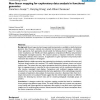Free Online Productivity Tools
i2Speak
i2Symbol
i2OCR
iTex2Img
iWeb2Print
iWeb2Shot
i2Type
iPdf2Split
iPdf2Merge
i2Bopomofo
i2Arabic
i2Style
i2Image
i2PDF
iLatex2Rtf
Sci2ools
118
click to vote
BMCBI
2005
2005
Non-linear mapping for exploratory data analysis in functional genomics
Background: Several supervised and unsupervised learning tools are available to classify functional genomics data. However, relatively less attention has been given to exploratory, visualisationdriven approaches. Such approaches should satisfy the following factors: Support for intuitive cluster visualisation, user-friendly and robust application, computational efficiency and generation of biologically meaningful outcomes. This research assesses a relaxation method for non-linear mapping that addresses these concerns. Its applications to gene expression and protein-protein interaction data analyses are investigated Results: Publicly available expression data originating from leukaemia, round blue-cell tumours and Parkinson disease studies were analysed. The method distinguished relevant clusters and critical analysis areas. The system does not require assumptions about the inherent class structure of the data, its mapping process is controlled by only one parameter and the resulting t...
Related Content
| Added | 15 Dec 2010 |
| Updated | 15 Dec 2010 |
| Type | Journal |
| Year | 2005 |
| Where | BMCBI |
| Authors | Francisco Azuaje, Haiying Wang, Alban Chesneau |
Comments (0)

